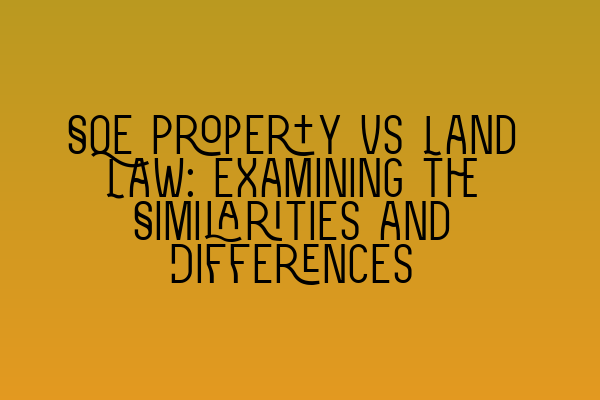SQE Property vs Land Law: Examining the Similarities and Differences
When it comes to property law and land law, there are often misconceptions about the similarities and differences between the two. As a solicitor specializing in property law, it is important to understand the nuances of both areas in order to provide effective legal advice to clients. In this article, we will explore the similarities and differences between SQE Property Law and Land Law to shed light on these often misunderstood concepts.
Similarities
While SQE Property Law and Land Law may seem distinct, they do share some key similarities:
- Legal Framework: Both property law and land law operate within a legal framework that governs the rights and obligations of individuals in relation to real property.
- Ownership: Both areas deal with the concept of ownership, defining the rights and responsibilities of property owners.
- Transactions: Property and land law encompass the legal processes involved in transferring ownership of real property through sales, leases, mortgages, and other forms of transactions.
Understanding these shared features can help solicitors navigate the complexities of property and land law more effectively.
Differences
While there are similarities, there are also significant differences between the two areas:
- Scope: SQE Property Law covers a broader range of topics compared to land law. Property law encompasses not only land but also other types of property, such as buildings, fixtures, and intellectual property. Land law, on the other hand, specifically focuses on the legal aspects of land ownership and use.
- Legal Principles: The legal principles governing property law and land law differ to some extent. Property law involves a mix of common law and statute, while land law relies heavily on common law principles such as the rule against perpetuities, the doctrine of estates, and the principle of priority in land registration.
- Legal Documents: Property law often involves the preparation and review of legal documents such as contracts, leases, and property deeds. Land law, on the other hand, may involve more administrative aspects, such as land registration and disputes over boundaries and easements.
By understanding these differences, solicitors can provide more accurate and tailored advice to clients seeking assistance with property or land matters.
Expertise and Professional Development
As a solicitor specializing in property law, it is crucial to continually enhance your expertise and stay updated with the latest developments in the field. SQE Property Law and Land Law exams are comprehensive assessments that evaluate your knowledge and understanding of these areas.
At SQE Property Law & Land Law, we offer a range of resources and support to help you succeed in these exams and excel in your career. Our SQE Contract Law: Analyzing Landmark Cases and Influential Judicial Decisions article provides valuable insights into the most significant cases influencing land law. For a deeper understanding of contractual capacity, rights, and limitations, our article on Understanding Contractual Capacity: Rights and Limitations is a must-read.
Looking to test your knowledge? Try out our Interactive SQE Mock Tests for Contract Law to assess your understanding of key concepts. Additionally, don’t miss out on the opportunity to join our SQE Contract Law Webinars for expert insights and guidance.
Preparing for SQE Property Law and Land Law exams can be challenging, but our comprehensive resources and expert guidance will help you master the essentials. Don’t hesitate to explore our article on SQE Prep: Mastering the Essentials of Contract Law to ensure you are fully equipped for success.
In conclusion, while SQE Property Law and Land Law share some similarities, they also have distinct differences. As a solicitor specializing in property law, it is essential to understand these nuances in order to provide effective legal advice. Continual professional development and access to relevant resources are key to staying informed and excelling in your practice.
